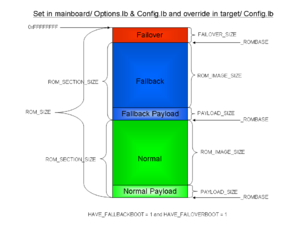Welcome to coreboot: Difference between revisions
Jump to navigation
Jump to search
mNo edit summary |
mNo edit summary |
||
| Line 4: | Line 4: | ||
'''coreboot''' (formerly known as LinuxBIOS) is a Free Software project aimed at replacing the proprietary BIOS (firmware) you can find in most of today's computers. It performs just a little bit of hardware initialization and then executes a so-called [[Payloads|payload]]. | '''coreboot''' (formerly known as LinuxBIOS) is a Free Software project aimed at replacing the proprietary BIOS (firmware) you can find in most of today's computers. It performs just a little bit of hardware initialization and then executes a so-called [[Payloads|payload]]. | ||
</div> | </div> | ||
{| cellspacing= | {| cellspacing=2 cellpadding=2 border=0 valign="top" width=100% | ||
|- | |- | ||
|style="vertical-align:top"| | |style="vertical-align:top"| | ||
| Line 15: | Line 15: | ||
* Runs in 32-Bit protected mode almost from the start | * Runs in 32-Bit protected mode almost from the start | ||
* Written in C, contains virtually no assembly code | * Written in C, contains virtually no assembly code | ||
* Supports | * Supports many [[Supported Motherboards|mainboards]]/[[Supported Chipsets and Devices|devices]]/[[payloads]] | ||
* Further features: netboot, serial console, remote flashing, ... | * Further features: netboot, serial console, remote flashing, ... | ||
</small> | </small> | ||
Revision as of 20:27, 25 March 2008
|
coreboot (formerly known as LinuxBIOS) is a Free Software project aimed at replacing the proprietary BIOS (firmware) you can find in most of today's computers. It performs just a little bit of hardware initialization and then executes a so-called payload.
|

Contact
|





